The 21 Moments That Defined The Oscars
Insiders reveal to BAZAAR.com the true stories behind the most shocking, scandalous and moving Oscars moments
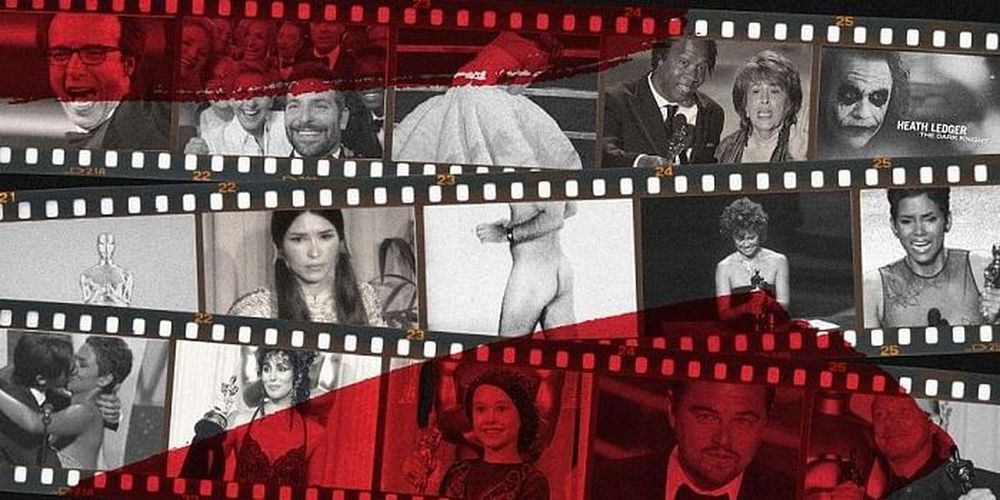
The Academy Awards are Hollywood's Super Bowl. While the annual telecast may seem over self-congratulatory at times, it's the most important night in show business. The show not only celebrates a medium that brings people from all over the world together, but it can also make a career. (Think Matt Damon and Ben Affleck circa 1998.)
The high-stakes event lends itself to raw emotions, which can lead to rare moments of candor from publicly cautious celebrities. The result? Some of the best water cooler talk of the year. But sometimes the behind-the-scenes stories are even juicier than what happens on the stage. We talked to the people who made headlines to find out what really happened and how spontaneous —or staged—the moments were.
Remember Chris Rock's searing #OscarsSoWhite monologue? A producer on the show that year tells us Rock came prepared that night: he spent six weeks working with 17 writers to create the perfectly memorable moment.
Here are 21 other moments—and the stories behind them—that define the history of the Oscars:
Related article: The 2017 Oscars Will Be Hosted By Jimmy Kimmel
1940: Hattie McDaniel is the first black Oscar winner
When McDaniel won the supporting actress statue for her portrayal of Mammy—a slave on the Georgia plantation Tara—in Gone With the Wind, she was forced to sit in the back of the venue due to segregation. "I sincerely hope I shall always be a credit to my race and to the motion picture industry," McDaniel said during her acceptance speech. It would be 51 years until the next African American won, when Whoopi Goldberg took home the Oscar in the supporting actress category for Ghost.
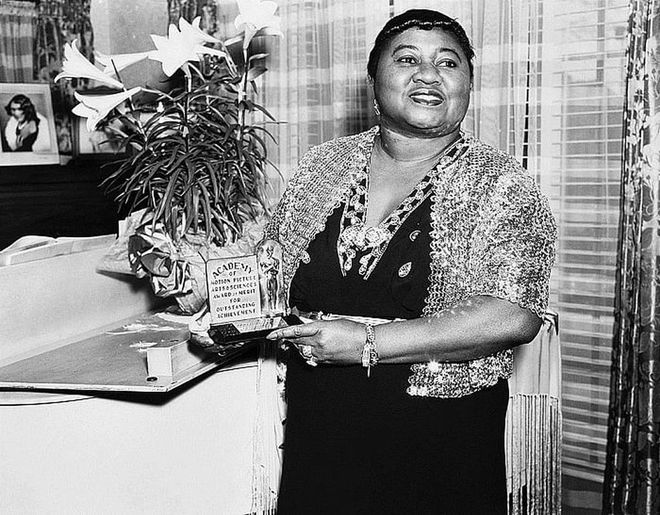
Photo: Getty
1943: Greer Garson pulls a Kayne with the longest Oscar speech of all time
You have Garson to thank for the 45-second Oscar acceptance speech rule. Garson, who won the Best Actress award for Mrs. Miniver, began her speech rather humbly by acknowledging the crowd. "Thank you," she said. "That is really all there is to say; but, as this is after all the opportunity of a lifetime, I hope you won't mind if I try to expand that word just, just a little." And then for five minutes, at one in the morning, Garson rambled on and on. (Think Kayne West's epic mic-dropping 2015 VMA acceptance speech and shave off a minute or two.) "This was a time when winners often gave no speech at all, or very short remarks," a spokesperson for The Academy tells BAZAAR.com. "It was also the last award of the night and past midnight, so it gained an immediate reputation which lives on today."
1964: Sidney Poitier becomes the first black man to win the Best Actor Oscar
When Poitier accepted the award, Anne Bancroft gave him a quick congratulatory peck on the cheek. Racial conservatives considered the kiss offensive—at the time, interracial marriage was still not legal in all 50 states and the Civil Rights Act had not yet been passed. It would be 38 years before another black man—Denzel Washington—won the category.
"It was a special evening," Poitier said when he reflected on that night in 2002, when he received an honorary Oscar. "It represented progress. It meant the embracing of a kind of democracy that had been very long in maturing."
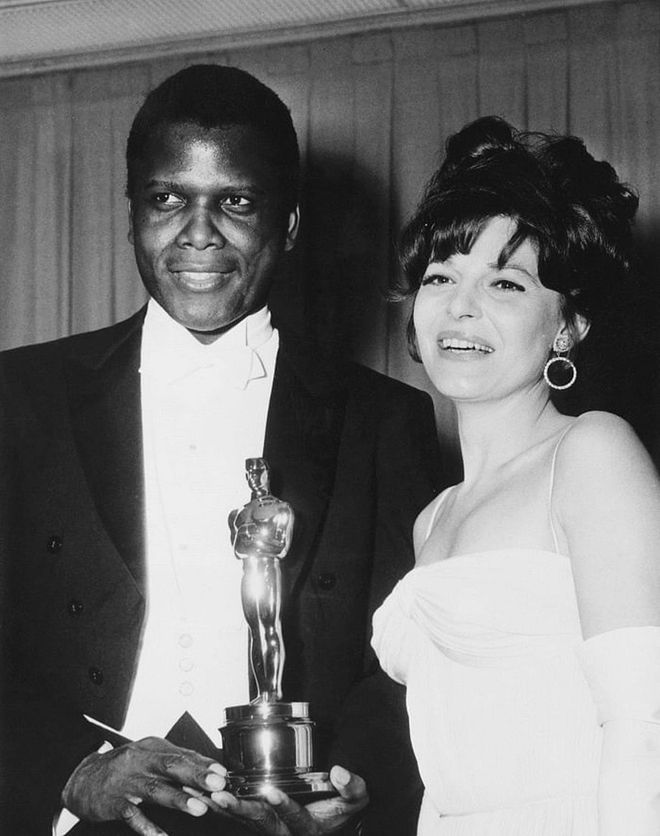
Photo: Getty
Oscar Moments
1969: Barbra Streisand and Katharine Hepburn split Best Actress win
"Hello, Gorgeous!" That's how Streisand greeted her first Oscar statuette for Funny Girl. Despite tying with Katharine Hepburn (The Lion in the Winter)—both actresses received 3,030 votes—Streisand stole the show thanks to Hepburn's absence. At the time, it was the third tie in the Academy's history; since then there have been three more.
Related article: From Red Carpet To Real World: 3 Looks From The Oscars 2016 You Can Cop For The Street
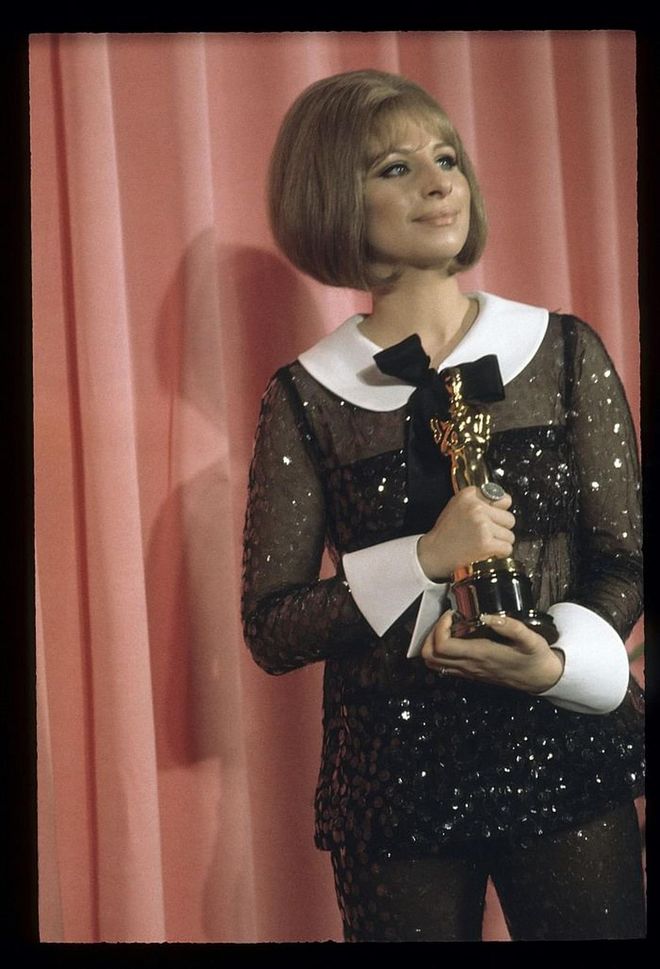
Photo: Getty
1972: Charlie Chaplin receives an honorary Oscar
Hollywood celebrated the legendary actor-director-writer-producer-composer with a 12- minute standing ovation, the entirety of which was not caught on camera. The night also marked the silent-era star's return to the U.S. after a 20-year politically imposed exile from the U.S. for alleged communist sympathies. "Words seem so futile—so feeble," Chaplin said. "I can only say thank you for the honor of inviting me here." Following the brief speech, the audience got back on their feet when Chaplin put on his trademark bowler hat and cane.
1973: Marlon Brando refuses his Oscar statuette
Brando was the first to use Hollywood's most prestigious awards show as a political platform. The actor, who won Best Actor for The Godfather, didn't attend the ceremony. Instead he sent a female Native American activist, Sacheen Littlefeather, to the stage to speak on his behalf.
"He very regretfully cannot accept this very generous award," said Littlefeather, who was wearing traditional Apache dress. "And the reasons for this being are the treatment of American Indians today by the film industry."
She received a mixture of boos and applause.
Three months later on The Dick Cavett Show, Brando said he didn't regret the decision to reject the award at the height of his career. "I felt that it was a marvelous opportunity for an Indian to be able to voice his opinion to 85 million people."
1974: A naked man takes the stage
It took a special person to steal the show from Elizabeth Taylor, but activist/artist/professional streaker Robert Opel managed to do just that. English actor David Niven was about to introduce Taylor, who would announce The Sting had won the award for Best Picture, when Opel ran across the stage wearing only his mustache.
"Isn't it fascinating to think that probably the only laugh that man will ever get in his life is by stripping off and showing his shortcomings?" Niven quipped.
Shockingly Opel, 33 at the time, wasn't arrested or even kicked out of the event. Instead he was gave a post-telecast press conference just like the evening's winners. "You know, people shouldn't be ashamed of being nude in public," he told reporters. "Besides, it is a hell of a way to launch a career."
But after the infamous sprint, Opel drifted back into obscurity only to surface again in national headlines when he was tragically shot to death in 1979.
1985: Sally Field's misquoted acceptance speech
The phrase "You like me, you really like me!" has been mocked by the likes of Madonna and Jim Carrey, and it's right up there with famous film phrases including, "You talkin' to me?" (Taxi Driver) and "Luke, I am your Father," (Star Wars). But like the Star Wars line, Field never actually uttered those words at the Oscars. What she actually said when she won Best Actress for Places in the Heart was, "I can't deny the fact that you like me, right now, you like me."
In 2015, the actress told The Hollywood Reporter that she hadn't allowed herself to feel her first win and wanted to "own" the second one. "I just said to myself, 'I'm gonna feel it' ... They had a huge, red, glaring light that started flashing in your face ... so I panicked ... and I remembered the part of me that said, 'You didn't say anything that mattered, you didn't say anything genuine,' (the first time) and I, without knowing it, said what I said ... It just came out."
1988: Cher's revealing win
Two years after wearing a shocking midriff-baring frock with matching feathered headdress to the Oscars, Cher rocked another outrageous Bob Mackie creation. The sheer, spider-web inspired dress overshadowed her endearing acceptance speech for Best Actress for her role in Moonstruck. After tripping over the outfit's shawl, Cher took the stage with just one earring in place.
After her win, the singer discussed the dress with reporters backstage. "Bob and I thought about [this dress] for a while. It went through so many changes. People were so weirded out about this dress, but I think it's quite appropriate for the evening."
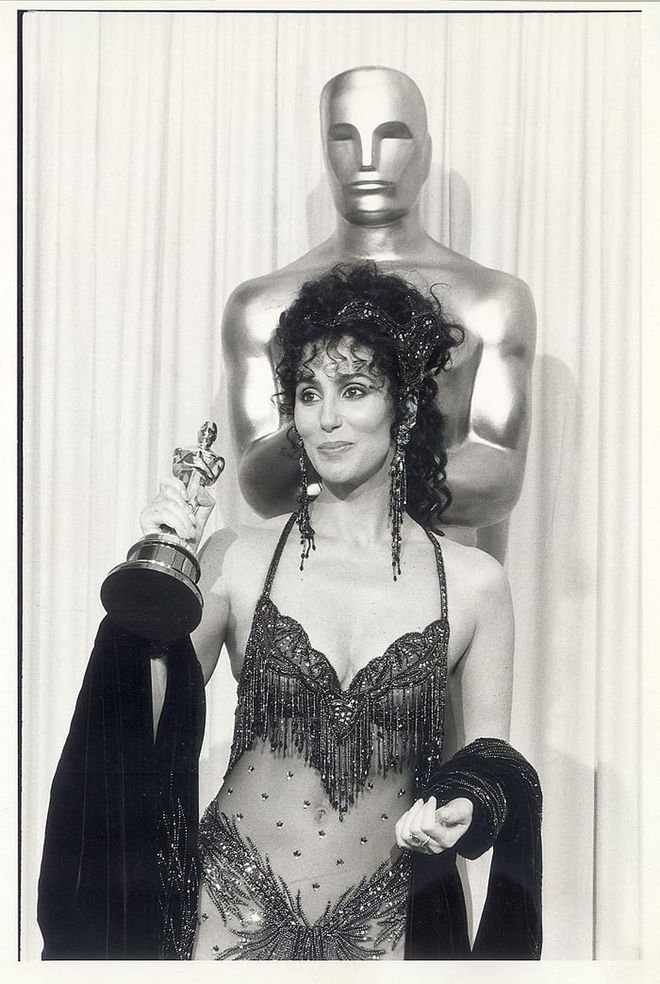
Photo: Getty
Cher
1991: Jack Palance does one-hand pushups onstage
At 73, the two-time nominee won a Best Supporting Actor Oscar for his work in City Slickers, and he showed his enthusiasm by doing three one-arm push-ups on stage. "That's nothing, really," he said of his impromptu workout.
His City Slickers co-star and the show's host, Billy Crystal ran with the moment, later joking to the audience, "Jack Palance just bungee jumped off the Hollywood Sign."
1994: Anna Paquin's adorably speechless win
Some winners feign shock and awe, but there's no doubt 11-year-old Paquin was stunned when Gene Hackman announced she won Best Supporting Actress for her first-ever on-screen role in The Piano. After getting out a few words, she skipped back to her seat, clutching the Oscar. In 2000 she told The Guardian that the experience was frightening: "I remember being very, very worried I wasn't going to be able to say anything."
Paquin is the second-youngest Oscar winner; Tatum O'Neal was 10 when she won for Paper Moon.
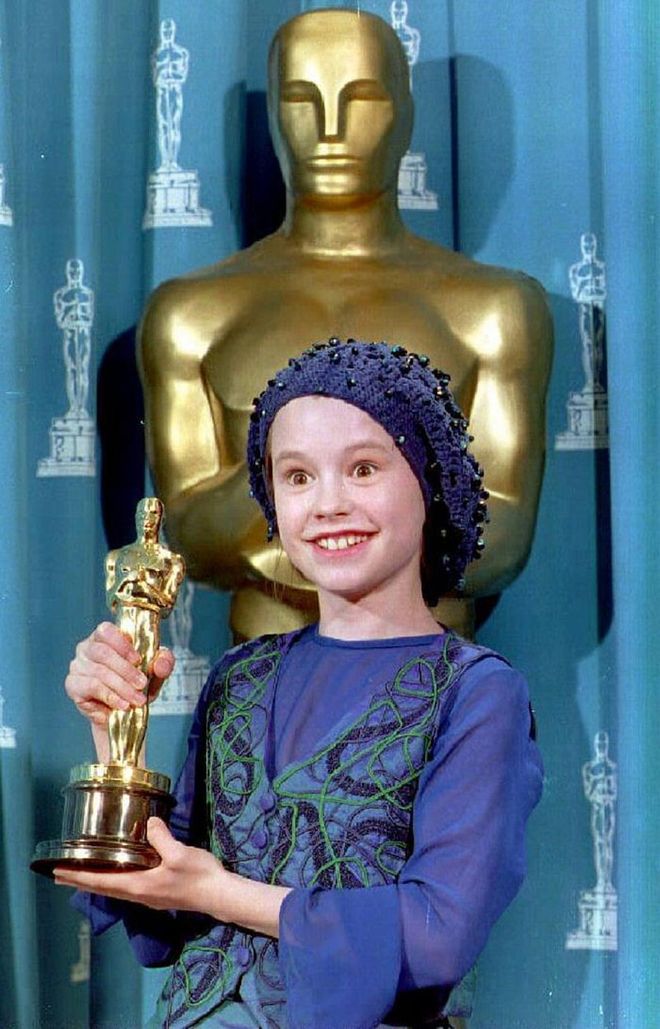
Photo: Getty
Anna Paquin
Related article: All The Celebrity Arrivals On The Oscars 2016 Red Carpet
1997: Cuba Gooding Jr. screams his speech over orchestra
It started out like a predictable Best Supporting Actor acceptance speech, but then the orchestra started to play—a signal to wrap it up—and Gooding, who won for Jerry Maguire, began to shout. For nearly a minute, the actor yelled out the names of his colleagues including co-star Tom Cruise.
"I walked on that stage and emotionally lost my mind," the actor told the American Film Institute. "I forgot who I was and where I was for a minute because I think I was closer to that character than any other character [I played] before. I think the emotional response I gave on that stage was the same thing [my character] would have given."
1999: Roberto Benigni gets excited
The 71st Academy Awards were all about Italian actor-director Benigni. His Holocaust comedy-drama, Life is Beautiful, won three Oscars that night, including Best Actor, Best Foreign-Language Film and Best Original Score. When Sophia Loren named Benigni winner of the foreign-language award, he promptly stood on the top of his chair and waved his hands in the air with glee. (Steven Spielberg helped him keep his balance.) Benigni then hopped (yes, hopped) up to the stage. "This is the moment of joy, and I want to kiss everybody…" he said.
2002: Halle Berry makes history
Berry's performance in Monster's Ball was extraordinary, but her acceptance speech for her work in the film was unforgettable. To this day, she is the only black woman to win the Best Actress category.
"This moment is so much bigger than me," a sobbing Berry remarked. "It's for every nameless, faceless woman of color that now has a chance because this door tonight has been opened."
But last year, at the annual Makers Conference, the actress expressed disappointment over how little that door has actually opened. "To sit here almost 15 years later, and knowing that another woman of color has not walked through that door, is heartbreaking," she said. "It's heartbreaking because I thought that moment was bigger than me. It's heartbreaking to start to think maybe it wasn't bigger than me."
2003: Adrien Brody plants one on Halle Berry
To say Brody was excited about winning Best Actor for his role in The Pianist is an understatement. Just ask presenter Halle Berry. Brody impulsively took Berry in his arms, dipped her back and laid one on her. "I bet they didn't tell you that was in the gift bag," Brody quipped.
The nonconsensual kiss immediately made the headlines, but it would take years for Brody to get flak for it. Last year, Slate writer Christina Cauterucci referenced the moment in an article about the unwanted kiss being a form of sexual assault.
"The most disheartening part of these images is that the women remain composed and gracious, keeping the focus on their respective events, even as their bodily autonomy is invaded," Cauterucci wrote of Berry and another situation involving Uma Thurman.
For her part, Berry spent most of Brody's speech wiping off her lower face. When asked by Access Hollywood in 2006 if the actor was a good kisser, Berry said, "Since we didn't really kiss, I can't tell you how good he was, but I can tell you this. He was wet."
2006: Crash wins over critic favorite, Brokeback Mountain
Even presenter Jack Nicholson seemed stunned when he opened the Best Picture envelope and saw that Crash beat Brokeback Mountain. The film, which through interwoven stories explores racial tensions in Los Angeles, received criticism not just for its overall mediocrity, but also for its portrayal of race relations.
Paul Haggis, the film's director, is still shocked it won. He tells BAZAAR.com, "We were a little tiny movie so, yes we were stunned. We thought we might be in contention for [best] screenplay, but for Best Picture? I was flabbergasted."
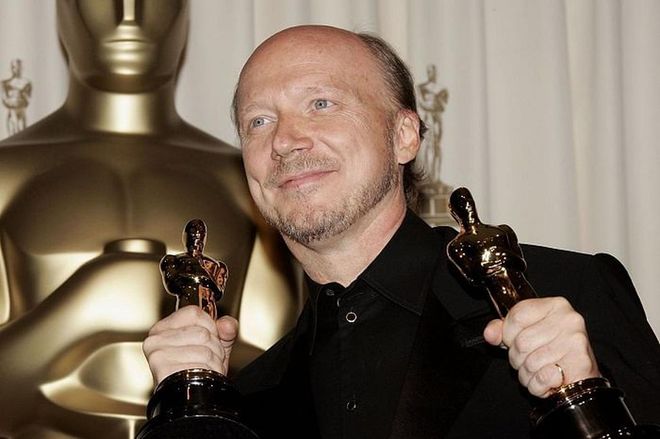
Photo: Getty
2009: Heath Ledger wins a posthumous Oscar
Ledger's 2008 overdose shocked Hollywood to its core. Seven months later, with the release of The Dark Knight, the actor stunned again with his brilliant performance as Joker. Ledger's family accepted the Best Supporting Actor statuette on behalf of his then three-year-old daughter, Matilda, whose mother is Michelle Williams.
"Heath, we both knew what you had created in the 'Joker' was extraordinarily special and had even talked about being here on this very day," said his sister, Kate Ledger. "We really wish you were, but we proudly accept this award on behalf of your beautiful Matilda."
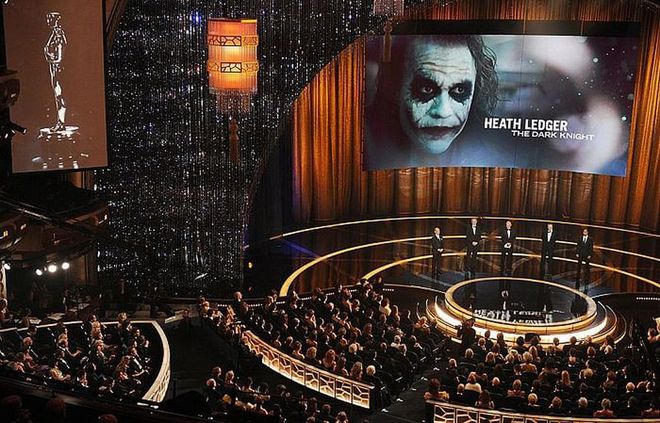
Photo: Getty
2010: Roger Ross Williams makes history and gets Kanye'd
When Music by Prudence won Best Short Documentary, Williams made history by becoming the first black director to win an Oscar. But the film's estranged producer, Elinor Burkett, who rushed the stage and ambushed William's acceptance speech, quickly overshadowed that moment.
"The man never lets the woman talk," she said. "Isn't that just the classic thing?"
Williams handled the situation with a smile, but it became the night's most infamous moment. The next day, Williams remembers his phone ringing off the hook. "I had a meeting and the hotel's concierge told me I couldn't go outside because there was so much paparazzi waiting for me," Williams tells BAZAAR.com. It became a running joke mentioned by David Letterman, Barbara Walters and Jon Stewart.
While Williams said he never spoke to Burkett again, he thinks of the brief moment as one of his best. "It put me on the map," he says. "It's kind of the best thing that every happened to me." Williams was nominated in 2017 for his feature documentary, Life Animated.
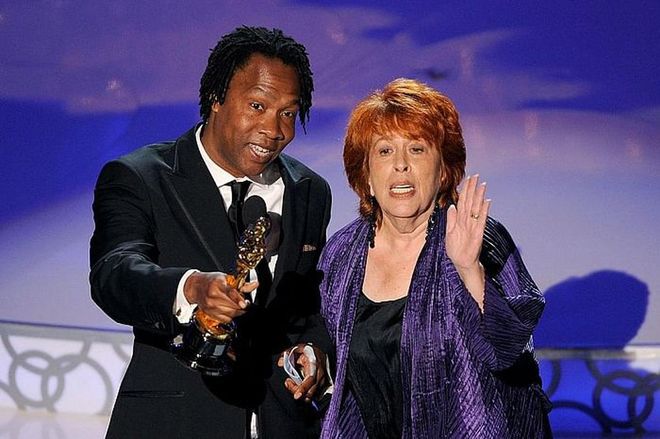
Photo: Getty
2013: Jennifer Lawrence falls down
On her way to retrieve her Best Actress Oscar for her work in Silver Linings Playbook, Lawrence fell midway up the stairs. "I was horrified," remembers four-time Academy Award production designer Derek McLane, who was sitting in the audience. "I thought someone had spilled something and then I realized it was her dress," McLane tells BAZAAR.com. "She got caught on it. Thank God she was okay."
2014: Ellen DeGeneres takes the best selfie in history
When Brad Pitt, Meryl Streep, Jennifer Lawrence, Bradley Cooper, Jared Leto and Angelina Jolie all pose for the same picture, it's bound to cause a stir. Presumably that's what host Ellen DeGeneres had in mind when she herded the A-listers into the same shot. According to Twitter numbers, 37 million people worldwide took a look, which in turn caused the site to crash. (The stunt was later revealed to be product placement by Samsung, which spent $20 million on airtime, according to the Wall Street Journal.)
"During rehearsal she mentioned that she might do something like that but she didn't rehearse it," remembers McLane. "It was remarkably clever."
Poor Liza Minnelli tried her best to be part of the photo opp, but, as can be seen in a pic posted by a Wall Street Journal reporter, her heels were just not high enough. "This picture explains why I never played basketball," Minnelli told the paper.
2016: Chris Rock's brilliantly uncomfortable opening monologue addressing #OscarSoWhite
In 2016, 20 white actors and actresses were nominated in the lead and supporting acting categories for the second year in a row. The result? An uproar and the social media hashtag #OscarsSoWhite. Host Chris Rock addressed the issue head-on by simultaneously making the audience laugh and cringe.
"I'm here at the Academy Awards, otherwise known as the White People's Choice Awards," he said. "You realize if they nominated hosts, I wouldn't even get this job. Y'all would be watching Neil Patrick Harris right now."
He didn't stop there. Instead, he unapologetically eviscerated Hollywood's racism by noting that in the show's 88-year history, more often than not, people of color were not included in the major acting categories.
According to David Hill, a producer on the show, it took Rock six weeks alongside 17 writers to create the 11-minute monologue. "We heard bits and pieces during rehearsals, but I hadn't heard the entire [speech]," Hill tells BAZAAR.com. "But of course I wasn't worried about [what he would say]. He's a pro."
2016: Leo finally wins—and uses his platform for a cause
After six nominations—including one for Titanic—and 27 years in Hollywood, Leonardo DiCaprio finally ditched his always-a-bridesmaid status and won a little gold man for his performance in The Revenant. He used his time on stage to speak about global warming, saying: "Our production needed to move to the southern tip of this planet just to be able to find snow. Climate change is real, it is happening right now. It is the most urgent threat facing our entire species, and we need to work collectively together and stop procrastinating…Let us not take this planet for granted."
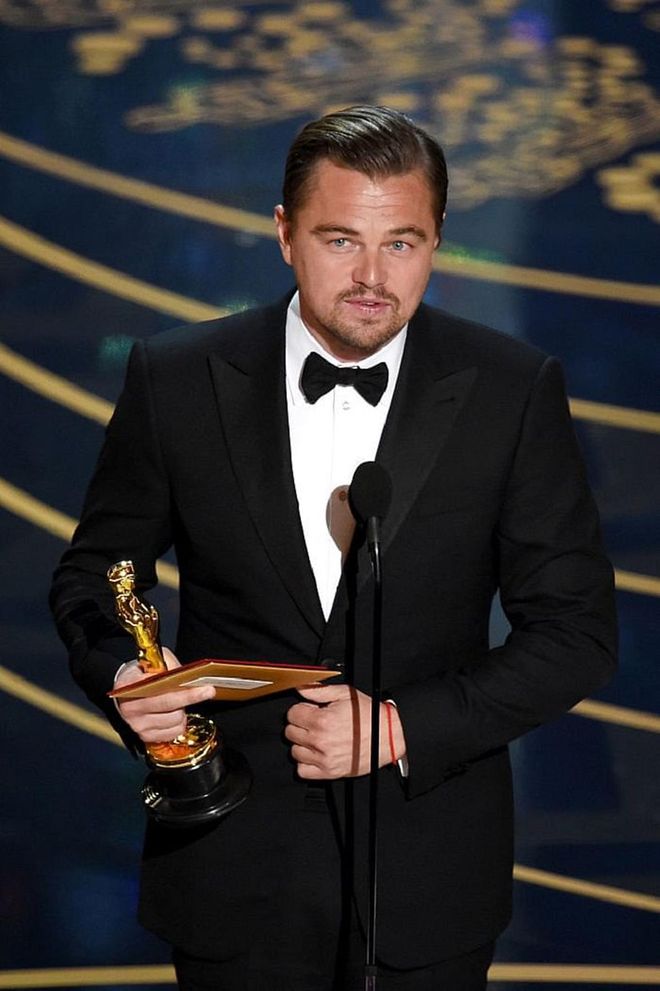
Photo: Getty
From: Harper's BAZAAR US